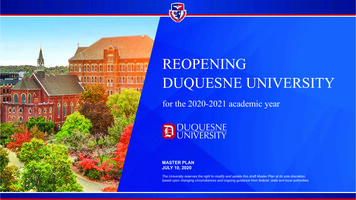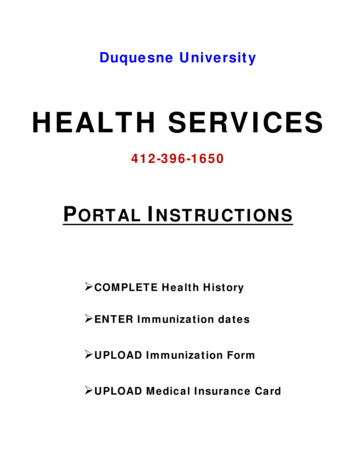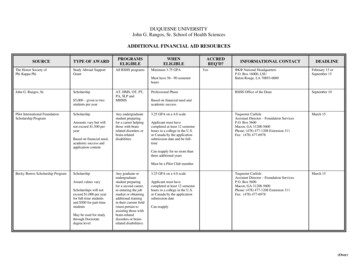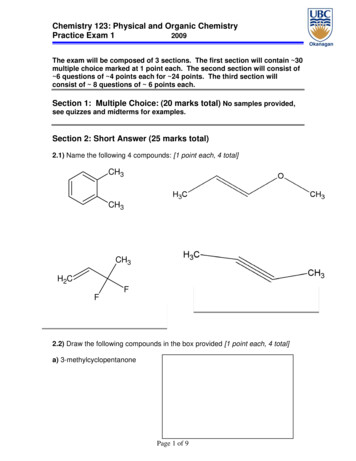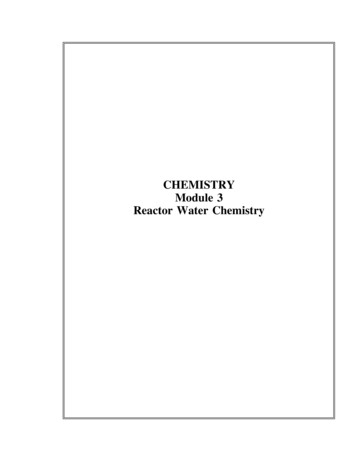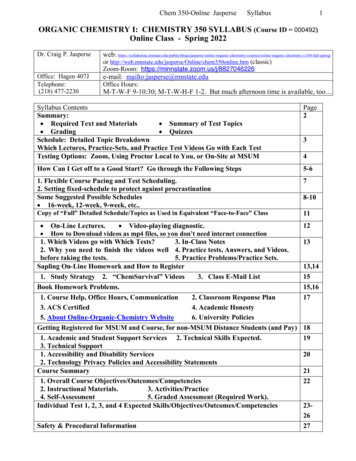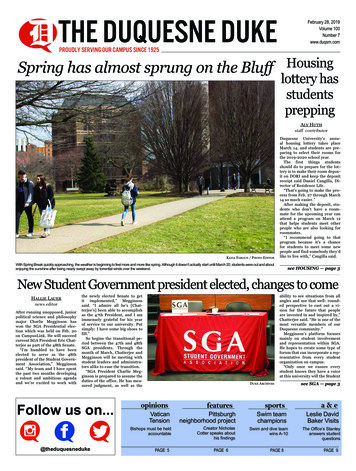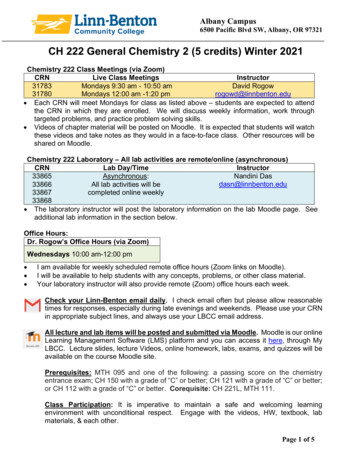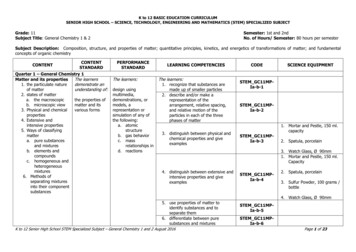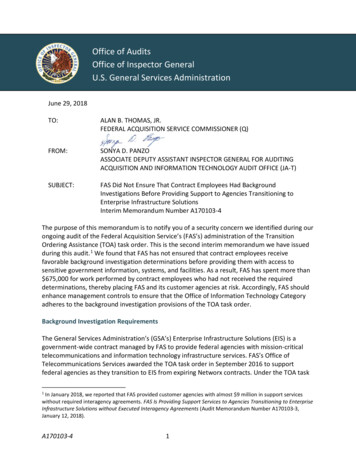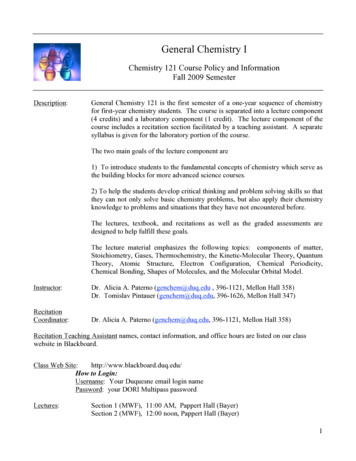
Transcription
General Chemistry IChemistry 121 Course Policy and InformationFall 2009 SemesterDescription:General Chemistry 121 is the first semester of a one-year sequence of chemistryfor first-year chemistry students. The course is separated into a lecture component(4 credits) and a laboratory component (1 credit). The lecture component of thecourse includes a recitation section facilitated by a teaching assistant. A separatesyllabus is given for the laboratory portion of the course.The two main goals of the lecture component are1) To introduce students to the fundamental concepts of chemistry which serve asthe building blocks for more advanced science courses.2) To help the students develop critical thinking and problem solving skills so thatthey can not only solve basic chemistry problems, but also apply their chemistryknowledge to problems and situations that they have not encountered before.The lectures, textbook, and recitations as well as the graded assessments aredesigned to help fulfill these goals.The lecture material emphasizes the following topics: components of matter,Stoichiometry, Gases, Thermochemistry, the Kinetic-Molecular Theory, QuantumTheory, Atomic Structure, Electron Configuration, Chemical Periodicity,Chemical Bonding, Shapes of Molecules, and the Molecular Orbital Model.Instructor:RecitationCoordinator:Dr. Alicia A. Paterno (genchem@duq.edu , 396-1121, Mellon Hall 358)Dr. Tomislav Pintauer (genchem@duq.edu, 396-1626, Mellon Hall 347)Dr. Alicia A. Paterno (genchem@duq.edu, 396-1121, Mellon Hall 358)Recitation Teaching Assistant names, contact information, and office hours are listed on our classwebsite in Blackboard.Class Web Site:http://www.blackboard.duq.edu/How to Login:Username: Your Duquesne email login namePassword: your DORI Multipass passwordLectures:Section 1 (MWF), 11:00 AM, Pappert Hall (Bayer)Section 2 (MWF), 12:00 noon, Pappert Hall (Bayer)1
Text:“Chemistry”, Eighth Edition by Zumdahl: Cengage Learning, 2010.Office Hours:Dr. Paterno’s office hours will be on Tuesdays (10-11:30am) and Fridays (2:153:15pm) and by appointment beginning on October 13th. Please come see me inmy office, Mellon Hall 358, during these times if you have any questions.Dr. Pintauer’s office hours will be on Tuesday’s (11:00-noon) and Thursday’s(11:00-noon) and by appointment from August 24 until October 13th. Please comesee me in my office, Mellon Hall 347, during these times if you have anyquestions.The office hours of the recitation TAs will be posted on blackboard.Contactingyour instructor:If you have any questions about course material or the course in general, you arewelcome to ask the course instructor after class or during the announcements inlecture.The best way to contact your instructor outside of class is via email togenchem@duq.edu. You are encouraged to send an email if you have anyquestions pertaining to the course or if you would like to set up an appointment tomeet outside of office hours. We are here to help you in any way that we can.When writing email, please don’t forget to address the email to Dr. Paterno or Dr.Pintauer and also to close with your full name. Including your lecture, recitation,and lab sections is also very helpful. We will respond to each and every one ofyour emails, but expect responses in a 24-48 hour window.If you have a question about a specific chemistry problem that you are solving, itis best to ask in person before sending an email because we are able to help youwith problem solving more effectively in person. You can see us immediatelybefore or after class or during our office hours when you have these types ofquestions.Student Resources: Chemistry Department Study Center. Tutors will be available to assist you withchemistry questions on the 3rd floor of Mellon Hall (Bayer Side) in the ChemistryDepartment Study Center. The Study Center is open from 1 pm – 9 pm, Mondaythrough Thursday and 1pm-5pm on Friday, starting the second week of classes.Specific tutors and times will be posted on the class website and also outside theStudy Center. Tutoring is on a first-come first-served basis and an appointment isnot necessary.2
Duquesne University Learning Skills Center. Students can also be tutored at theLearning Skills Center on the ground floor of the Administration Building (3966034). Students will need a referral from their advisor so that they can make anappointment to meet with a tutor at the center.Student Solutions Manual. A partial solutions manual will be available tocomplement the textbook. It should be used to check your answers and workwhen practicing problems at the end of each chapter. BEWARE: Relying on theanswer book can mislead you into thinking that you understand a concept. Youultimately must be able to solve all assigned problems without the help of the textor solutions manual.Student Study Guide. Covers major points from each chapter in the text.Sometimes the material is presented with a slightly different approach from theauthor. The study guide serves as a useful resource, especially when topic(s) inthe text are presented in a way that you may find confusing. The study guidecontains chapter outlines, visuals and schematics, and shaded example problemswith full solutions.General Chemistry 1 as a Second Language (by David R. Klein). A study guidethat focuses on some of the fundamental principles of this course. This bookexplains some common mistakes made by students and helps students developproblem solving skills necessary to succeed in general chemistry.Molecular Model Set – Advanced VSEPR (Indigo Instruments). In this course wewill discuss how to predict molecular geometry and bond angles for discretemolecules. This molecular model set is an excellent tool to help students visualizethe structures of molecules and predict molecular geometry. Model sets can bepurchased at the Chemistry Stockroom on the 3rd floor of Mellon Hall.StudentExpectations:Learning chemistry is not a spectator sport; it requires you to take an active role.Your instructors are here to help you but ultimately you bear the responsibility forlearning chemistry and making it your own. To do this you must go beyond simplememorization of facts to a real understanding of the concepts of chemistry.To achieve this goal you should (1) listen to the overview of concepts given inlecture (2) read the appropriate sections of the textbook a few times (3) challengeyourself with homework problems, especially problems you have NOT seenbefore and (4) have discussions with your peers and your teachers.3
Recitation:The purpose of recitation is to give you a small classroom atmosphere where youcan (re)learn concepts and practice problems while having the opportunity toparticipate by asking and answering questions. This is not a session in which theTA does the homework while you listen. You will be expected to assume an activerole in the discussion section and work together with other students to understandconcepts.Absences:Your attendance for lecture and recitation sections is mandatory. You areresponsible for all announcements and material given during class even if you areabsent. Examinations and quizzes will be heavily based on lecture and homeworkmaterial. See the “Make-up Policy” on the next page if you miss an examination.The Fall 2009 semester begins August 24th and ends on December 17th. It isassumed that as a condition of enrollment, you plan to be in attendance for allexaminations and classes between those dates. It is your responsibility to arrangeyour travel plans around the schedule of these classes. Special notices, schedulechanges and assignments will be announced in class. These are bindingirrespective of whether you were present or not.Examinations:For the Fall 2009 semester, three lecture examinations will be given, plus a finalexamination. The final exam will be cumulative over all course material. See the“Make-up Policy” below, if you miss an examination.Exams contain both multiple choice and short answer questions.answer questions must be answered in blue or black ink.All shortExam 1100 pts6-7:30 pm, Tuesday September 22, 2009Exam 2100 pts6-7:30 pm, Tuesday October 20, 2009Exam 3100 pts6-7:30 pm, Tuesday November 17, 2009Final Exam200 pts3:30-6 pm, Thursday December 10, 2009** You must bring the proper calculator to all examinations! Advancedcalculators with alpha-numeric I/O capability, the ability to program information(“graphing calculators”), and the ability to solve the quadratic equation will beNOT allowed in examinations. An inexpensive calculator with ln x, ex, log x, 10x,and yx functions should be purchased. Examples include, but are not limited to,TI-30XA, TI-30X IIB, and TI-30X IIS. A list of acceptable calculators is postedon Blackboard. Use of unacceptable calculators is prohibited during exams andquizzes. ***Quizzes:A total of 8 quizzes will be given this semester. Quizzes will be worth 15 pointseach, are based on lecture material, and will be given during the recitationsessions. The lowest quiz grade will be dropped, giving a possible quiz total of105 points (7 quizzes).4
Make-up Policy:There are no make-up examinations or quizzes. If you miss a regularly scheduledexam, your final exam will be prorated. Please contact your lecture instructor ifyou will not be present during an exam. If you miss a quiz, that score will be theone that is dropped. Further missed quizzes will result in a score of zero in thegradebook.Regrade Policy:All examination regrade requests must be made on an official regrade requestform provided by Dr. Paterno and Dr. Pintauer. The examination with the requestform must be placed in the regrade box in Mellon Hall 308 by the deadlineannounced in class. If a regrade request form is not used and/or the request andexam are not submitted by the deadline, the exam will not be regraded. Shortanswer questions must have been answered in blue or black ink for your testpaper to be regraded. Answers written in another medium will not be regraded.If you submit an exam for a regrade, the entire exam will be regraded.Homework:Homework is assigned in this course to help you develop problem solving skillsand a mastery of the course material. Students who practice the homeworkproblems sufficiently so that they can solve them independently of the textbook,notes, and other outside assistance, tend to do well on exams and quizzes.Graded homework for this course will be completed on the computer using aprogram called WebAssign. Detailed instructions will be posted on Blackboard.WebAssign assignments are worth 110 points cumulatively. Due dates for thehomework will be posted in WebAssign and also announced in lecture. You mustpurchase a WebAssign access card to gain access to this program. This can bedone at the bookstore or online.In addition to electronic homework problems, you are responsible for completingadditional homework problems assigned from the textbook. While theseassignments will not be collected or graded, their completion will help you to besuccessful in this course.PRS ClassParticipation:Students will have an opportunity to earn 35 class participation points by usingtheir PRS clickers in lecture. The personal response keypads can be purchasedfrom the bookstore and can be used in all classes at DUQ that are using thistechnology.Students are responsible for registering their clicker ID # with the courseinstructor. Clicker ID#s will be listed in Blackboard and used to track studentparticipation. Points will be awarded for participation, regardless of whether thequestions were answered correctly.5
It is the students’ responsibility to make sure that their device is working properlyby checking excel files that are posted on blackboard and by looking for theirindividual student number on the bottom of each powerpoint slide. If an error ordiscrepancy is found, the student must contact the course instructor ASAP duringthe semester so that the correct action can be taken to remedy the situation. Alldiscrepancies must be reported prior to the final exam. Failure to do so will resultin no change in PRS grade.Giving your PRS keypad to another person so that they can use it during lecture toearn participation points for you in your absence AND / OR Using someone else’sPRS keypad during lecture so that the other person can earn participation pointseven though they are not present are both violations of the Duquesne UniversityAcademic Integrity Policy (see below). If anyone is found engaging in theactivities above, the consequences will be as follows:1. Both students will be given zero points for class participation2. Both students will be referred to either the Judicial Board or thePharmacy Honors Council, depending on the student’s major.Honor Code:Each student is expected to behave with the utmost maturity and integrity. Allstudents are responsible for reading, understanding, and upholding the “Code ofStudent Rights, Responsibilities and Conduct” and the BSNES academic integritypolicy which is located at iolations of academic integrity include (but are not limited to): giving orreceiving assistance or using unauthorized material as a test aid, attempting toalter a score or grade recorded on an exam or quiz by the instructor, submittingany document, e.g. lab report, essay or assignment that contains sentences orparagraphs that have been directly copied from another source (ie: textbook orstudent), attempting to adjust a score on a graded paper or test, and changinganswers on a graded exam and submitting the exam for a regrade.Signed pledges are required for written work submitted for evaluation, but theabsence of a signed pledge does not free a student from the ethical standardsrequired by the Code. Procedures for dealing with infractions of the Code,including provisions for appeals, are printed in the text of “The Student Handbookand Code of Student Rights, Responsibilities and Conduct.” If anyone is caughtviolating
Duquesne University Learning Skills Center. Students can also be tutored at the Learning Skills Center on the ground floor of the Administration Building (396-6034). Students will need a referral from their advisor so that they can make an appointment to meet with a
